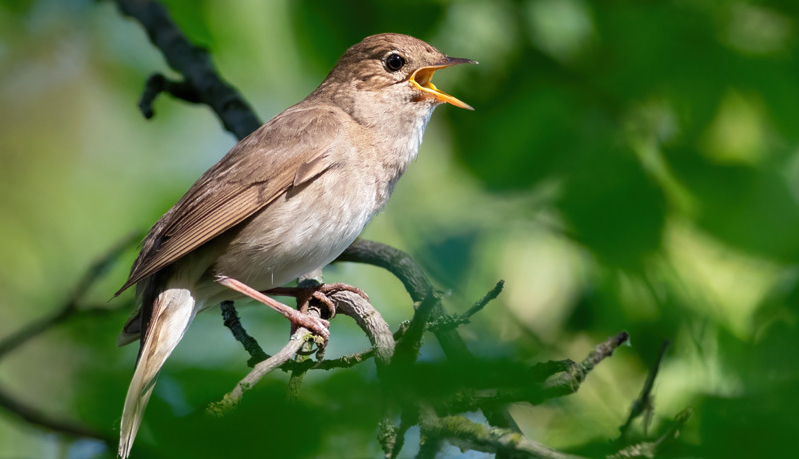
Of late, I have really come to appreciate the birdsong that I can hear outside my window at home. Every morning now when I wake up, I give thanks to God for the birds singing outside. Occasionally, it’s too early and still dark outside when I first awake, and so all is quiet. On those days, a part of me wishes that I could just fall asleep again, but at the same time, I love being a part of that special moment when I hear the first birds start singing for the day.
There is something very touching about picturing the birds waking up from their night’s rest and starting their morning rituals. This medley of sound has been aptly described as the dawn chorus, and it’s an evocative and poetic description that I absolutely love.
There are several scientific reasons why birds sing in the morning. One suggestion is that because light levels are too low, it’s difficult for birds to forage and so they sing instead. Another is that birds vocalize loudly as a sign of their strength and vitality, and that this is a way to attract potential mates and claim or defend their own territory.
I also learned that there is an order in which different birds start joining in the morning chorus. While the symphony of singing may sound like a free-for-all to the untrained ear, in actual fact, "the singers know exactly when their slot is and if you listen regularly you will start to recognize certain species habitually starting before others" (according to wildlife expert Ben Andrew).
I admit I am not really a bird expert, but I have grown to appreciate the constancy of the birds and how I can count on them to start each morning with their singing. I thank God that I have been given ears to hear the varied sounds that different birds make. And I am thankful that I have trees outside my window for the avian choristers to perch on. I am also thankful that my mornings, while punctuated by the sounds of cars, are generally quiet and peaceful enough for me to hear the sounds of nature.
Apart from these blessings for which I thank God, the birds remind me of several important truths. Regardless of whatever scientific reasons there are for birds to start singing early in the morning, the fact remains that they are part of God’s creation, and the Bible says that all creation reflects the Creator's "eternal power and divine nature" (Romans 1:20). More than that, we read in Psalm 148 that all the heavens and earth are meant to praise the Lord:
"Praise the Lord. Praise the Lord from the heavens, praise him in the heights above. Praise him, all his angels, praise him, all his heavenly hosts. Praise him, sun and moon, praise him, all you shining stars. Praise him, you highest heavens and you waters above the skies. Let them praise the name of the Lord, for he commanded and they were created. He set them in place for ever and ever; he gave a decree that will never pass away.
Praise the Lord from the earth, you great sea creatures and all ocean depths, lightning and hail, snow and clouds, stormy winds that do his bidding, you mountains and all hills, fruit trees and all cedars, wild animals and all cattle, small creatures and flying birds, kings of the earth and all nations, you princes and all rulers on earth, young men and maidens, old men and children." (Psalm 148:1-12)
I love that the Psalmist spells out just what is covered in "the heavens" and "the earth". Lest we think that "the earth" is just a way of saying "people of the earth", the Psalmist gives a staggering list of which earthly creations are to praise the Lord. It includes animals of the land, sea and sky, land-forms and vegetation.
Weather elements, we are told, are under God’s command, as well as people of every nation and age. Since all creation is exhorted to praise the Lord, I think it is not too much of a stretch for me to imagine the birds singing to their Maker when I hear birdsong in the morning. And it reminds me that it is a fitting start to the day to be singing to and praising the Lord for seeing us safely through the night and before we embark on any of our plans for the day.
If... God cares for the birds, then I can trust that he cares for me and will provide for me.
I find it immensely comforting that the Bible tells us explicitly (not only in Matthew 6:26 but also in Luke 12:24, Job 38:41 and Psalm 147:9) that God feeds the birds.
The Bible also tells us explicitly that God knows every bird (Psalm 50:11) and not one sparrow will fall to the ground without his knowledge and outside of his will (Matthew 10:29). If that is how God cares for the birds, then I can trust that he cares for me and will provide for me.
Then I am reminded that it is possible for us to glorify God as well as bless and edify others, even when we are just going about our day doing our so-called ordinary things. It is said that when birds sing, they are not actually singing for our enjoyment. Instead, they are simply doing what they were designed to do and, in some cases, what they have to do.
I am quite sure the birds outside my window have no inkling that I thank God for them and that they have inspired me to write rather a lot of words on this topic! Might the same be true of us, as we go about our day doing our ‘ordinary’ things? Who might be thanking God for us, and might we be an inspiration to someone without our even knowing it, simply by doing what we are meant to do? Some time ago, I was looking up the word ‘sanctification’, and became very intrigued when I read in "Baker’s Evangelical Dictionary of Biblical Theology":
"The generic meaning of sanctification is 'the state of proper functioning'. To sanctify someone or something is to set that person or thing apart for the use intended by its designer. A pen is 'sanctified' when used to write. Eyeglasses are 'sanctified' when used to improve sight. In the theological sense, things are sanctified when they are used for the purpose God intends. A human being is sanctified, therefore, when he or she lives according to God’s design and purpose."
As I think about the birds starting their day with birdsong, doing what they were created to do, I see a sense in which they are glorifying their Maker simply by doing just that. Perhaps the same applies to us too. We were created to honor God, to love him and to love our neighbors. While there are of course exceptional circumstances, by and large it is in the midst of the ordinary mundane things of life that we have to do that we live out the purposes for our lives that God intended. And doing that faithfully is in itself a way of glorifying our Maker and blessing others.
To close, I would add that as I listened to the birds and reflected on Matthew 10:29-31 one morning recently, I was suddenly struck by how amazing it is that the God who created the heavens and the earth is the same God who numbers the hairs on my head. How can it be that a God so powerful and all-encompassing would listen to my feeble prayers and care about puny little me? And yet, it is plain as day in the Bible that it is true. God loves and cares for each of us, as an individual and unique child of his, a child who is "fearfully and wonderfully made" (Psalm 139:14).
The Almighty Creator who has the entire universe at his disposal and for whom nothing is too difficult (Jeremiah 32:27)—this is the God who knows everything about us, who has called us, and who will be faithful to keep us till the very end.
[This is a shortened version of ‘Birdsong’. You can read the fuller version here.]
Originally published by A Rocha International. Republished with permission.
Ramona Tang works as an associate professor of applied linguistics. She loves writing, listening to worship songs and noticing the beauty and design of God’s creation. More of her reflections on faith and nature can be found at everythingforhisglory.wordpress.com
A Rocha is a global family of conservation organizations working together to live out God’s calling to care for creation ?and equip others to do likewise. A Rocha means ‘The Rock’ in Portuguese and the initiative is present in more than 20 countries around the world. They provide a missional response to the global crisis of biodiversity loss by carrying out community-based conservation projects, aiming to protect the environment through local, community-based conservation, scientific research, and environmental education.
All of the text in the opinion above is licensed under a Creative Commons Attribution-ShareAlike 4.0 International Licence.





